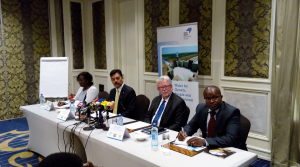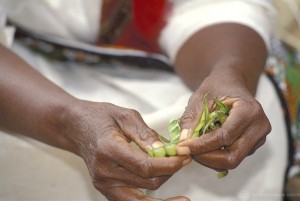Kenya tackles future water gap with 2030 Water Resources Group

Nairobi, Kenya, 12 October 2015—The Kenya 2030 Water Resources Group (2030 WRG) Partnership was launched today at a high level roundtable which brought together senior members of Kenya’s government, private sector and civil society to discuss solutions to bridging the gap between the country’s future water demand and supply.
If Kenya maintains a “business-as-usual” approach to managing its water resources, by the year 2030, there will be almost one-third less available water than required to meet the country’s development needs. Several areas central to the country’s economy, such as the Athi River Basin, are already feeling the effects of water stress and require urgent action to prevent water from becoming a constraint to sustainable growth.
Speaking ahead of the event, Cabinet Secretary, Ministry of Water and Irrigation, Eugene Wamalwa, said, “Ensuring a safe and abundant supply of water is vital to attaining our Vision 2030, which aims to transform Kenya into an industrialized middle income country by the year 2030. This partnership with the private sector and civil society will help generate collective solutions to secure water for the economy, society and the environment.”

Practical opportunities to be developed through Kenya’s 2030 WRG partnership include: improving agricultural water productivity (“more crop per drop”); strengthening urban and industrial water efficiency and reuse, and creating new financing mechanisms for both water supply expansion and improved demand management.
CEO of Bidco Africa—one of Kenya’s leading manufacturers and marketers of consumer goods—Vimal Shah, stated during the roundtable, “Water is the lifeblood for everyone and also for manufacturing businesses too. For all of us reducing water consumption, and improving wastewater treatment, are important steps that all companies can take. But ultimately water is a common resource, and it is only through more ambitious, collective efforts, such as this Kenya 2030 WRG partnership, that we will deliver action at the scale needed to address the challenge.
Chairman of Kenya Water and Sanitation CSOs Network, Annabell Waititu added, “A coordinated and active network of relevant stakeholders is key to ensuring that the water and sanitation needs of all Kenyans are met. The 2030 WRG is one important step in that direction.”
2030 WRG Executive Director Anders Berntell, said, “Across the globe, WRG partnerships are helping push the water resources agenda to the forefront of high level national debate. In Kenya, the appetite for such discussions, and the interest in exploring new approaches is very impressive. This is good news and will be critical to ensure Kenya’s sustainable development and use of its scarce water resources.”
Media contacts
Alida Pham, Global Communications Lead (Washington DC, USA) +1 202 603 2535, or email apham4@ifc.org
Josephine Gustafsson, Africa Regional Lead (Nairobi, Kenya)+254 736 702 329 email jgustafsson@ifc.org
